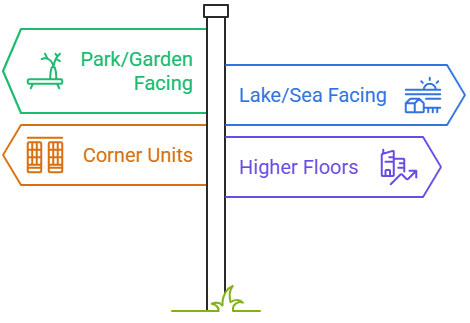Hidden Costs of Home Buying in India: What Most Buyers Overlook
- 24th Apr 2025
- 1150
- 0

Never miss any update
Join our WhatsApp Channel
Buying your dream home in India is a significant milestone, but it often comes with financial surprises that can strain your budget. Research suggests these hidden costs can add 10%-25% to your total expenditure. Understanding these expenses beforehand can help you plan better and avoid last-minute financial stress. This comprehensive guide breaks down all the hidden costs you might encounter when purchasing a property in India.
Legal and Government Fees
Stamp Duty
Stamp duty is a mandatory tax paid to the state government for registering property documents. This varies significantly across Indian states:
- Maharashtra: 5%-6% (with Mumbai having different rates)
- Karnataka: Tiered system with 5% for properties above ₹45 lakh, 3% for ₹20-45 lakh, and 2% for properties below ₹20 lakh
- Delhi: 4% for women buyers, 6% for men, and 5% for joint ownership
- Tamil Nadu: 7% flat rate
For a ₹50 lakh property in Bangalore, the stamp duty would amount to approximately ₹2.5 lakh.
Registration Fees
This fee is charged for legally transferring ownership and typically costs around 1% of the property value. For a ₹50 lakh property, you'd pay about ₹50,000 as registration fees.
Additional Charges
Some states levy extra charges on top of stamp duty:
- Cess: Usually 10% of the stamp duty amount
- Surcharge: 2% for urban properties above ₹35 lakh and 3% for rural areas
These legal and government fees alone can add up to 7%-10% of your property value, making them one of the largest hidden costs in the home-buying process. For more details on property registration in Gujarat, check out our comprehensive guide to Gujarat property registration.
Taxes
GST (Goods and Services Tax)
GST at 12% applies to under-construction properties but not to ready-to-move-in homes with a completion certificate. This distinction is crucial:
- For a ₹50 lakh under-construction flat, you'll pay an additional ₹6 lakh as GST
- Ready-to-move-in properties with completion certificates are exempt from GST
Property Tax
This is an annual tax paid to the local municipal corporation based on the property's value and location. Rates vary across cities:
- Mumbai: 0.5%-1% of property value
- Delhi: 10%-20% of annual rental value
- Bangalore: 0.2%-0.8% of guidance value
While property tax is an ongoing expense rather than an upfront cost, factoring it into your long-term budget is essential. Learn more about property tax in South Delhi and Gurugram property tax in our dedicated guides.
Property-Related Charges
Parking Charges
In metropolitan cities, parking spaces often come at a premium and aren't always included in the property price:
- Open parking: ₹2 lakh to ₹3 lakh
- Covered/basement parking: ₹3 lakh to ₹5 lakh
- Premium parking (near entrance/elevator): ₹4 lakh to ₹7 lakh
For example, in a high-rise apartment in Gurgaon, you might pay ₹3.5 lakh for a single covered parking slot. Learn about your parking rights as a home buyer before making a decision.
Preferential Location Charges (PLC)
Developers charge extra for units with desirable views or locations:
- Park/garden facing: 3%-5% premium
- Lake/sea facing: 5%-10% premium
- Corner units: 2%-5% premium
- Higher floors: 1%-3% premium per floor (after a certain level)

A lake-facing apartment in Pune might cost an additional ₹3-5 lakh compared to identical units without the view.
Floor Rise Premium
Many developers charge extra for apartments on higher floors:
- Typically ₹50-100 per sq. ft. for every floor above a certain level (usually 3rd or 4th floor)
- For a 1,000 sq. ft. apartment on the 10th floor, you might pay an additional ₹3-6 lakh compared to a ground floor unit
Before making your decision, check out the pros and cons of top floor living in India.
Maintenance and Society Charges
Maintenance Deposit
This upfront deposit covers society maintenance for a specific period:
- Short-term deposits: 6-12 months of maintenance charges
- Long-term deposits: Some societies collect 5-10 years of maintenance upfront
In premium housing societies in Bengaluru or Mumbai, this could amount to ₹2-5 lakh for a 2BHK apartment.
Monthly Maintenance Fees
These recurring charges cover common area upkeep, security, and utilities:
- Budget societies: ₹2-3 per sq. ft. per month
- Mid-range societies: ₹3-5 per sq. ft. per month
- Premium societies: ₹5-10 per sq. ft. per month
For a 1,200 sq. ft. apartment in a mid-range society, expect monthly maintenance costs of ₹3,600-6,000.
Clubhouse and Amenity Fees
Many modern housing complexes charge separate fees for clubhouse access:
- One-time membership fee: ₹50,000-₹2 lakh (depending on amenities)
- Annual fees: ₹10,000-₹50,000
Home Loan-Related Costs
Processing Fees
Banks charge this for processing your loan application:
- Typically 0.5%-1% of the loan amount
- Some banks cap it at ₹10,000-₹25,000
- For a ₹40 lakh loan, you might pay ₹20,000-₹40,000 as processing fees
Property Valuation and Technical Verification
Banks conduct property assessments before approving loans:
- Valuation fees: ₹2,000-₹5,000
- Technical verification: ₹2,000-₹5,000
Legal Verification
Banks verify property documents to ensure they're legally sound:
- Legal verification fees: ₹3,000-₹10,000
Insurance Premiums
Most banks require you to purchase property insurance and sometimes loan protection insurance:
- Property insurance: ₹5,000-₹15,000 annually (depending on property value)
- Loan protection insurance: 1%-3% of loan amount (one-time premium)
Looking to save on home loan interest? Check out our guide on how to save lakhs on home loan interest in India.
Brokerage and Professional Fees
Brokerage Fees
Real estate agents typically charge 1%-2% of the property value. On a ₹50 lakh property, you might pay ₹50,000-₹1 lakh as brokerage. Always ensure your broker is RERA-registered to avoid disputes. Before engaging a broker, read about 7 crucial questions to ask your broker.
Legal Consultation
Hiring a property lawyer is highly recommended to verify documents and ensure a smooth transaction:
- Document verification: ₹15,000-₹30,000
- Legal opinion: ₹5,000-₹15,000
- Contract review: ₹10,000-₹25,000
Home Inspection Services
Professional home inspectors can identify structural issues, water seepage, and electrical problems:
- Basic inspection: ₹5,000-₹10,000
- Comprehensive inspection: ₹10,000-₹25,000
This investment can save significant renovation costs later.
Interior and Relocation Expenses
Interior Decoration
Basic interior work for a newly purchased 2BHK apartment typically costs:
- Painting: ₹50,000-₹1 lakh
- Electrical work: ₹25,000-₹50,000
- Plumbing: ₹20,000-₹40,000
- Fixtures and fittings: ₹1-2 lakh
Looking for interior design inspiration? Check out top interior design Instagram accounts in Chennai and Bangalore.
Furniture and Appliances
This varies widely based on your preferences but expect to spend:
- Basic setup: ₹3-5 lakh
- Mid-range setup: ₹5-10 lakh
- Premium setup: ₹10 lakh and above
Relocation Costs
Moving expenses can add up:
- Packers and movers: ₹15,000-₹50,000 (depending on distance and volume)
- Temporary accommodation: If there's a gap between your old and new residence
Costs Due to Project Delays
Additional Rent
If your project is delayed and you're living in rented accommodation:
- For a 6-month delay on a ₹20,000 monthly rent: Additional ₹1.2 lakh expense
Pre-EMI Interest
If you've taken a loan for an under-construction property:
- You pay interest on the disbursed amount without building equity
- For a ₹40 lakh loan at 7% interest with a 1-year delay: Approximately ₹2.8 lakh in additional interest
Opportunity Cost
Delays also mean:
- Lost rental income (if you planned to rent out the property)
- Delayed tax benefits on home loan repayments
Considering under-construction property? Read essential tips before buying an under-construction flat in India.
Smart Ways to Manage Hidden Costs
Budgeting Strategies
- Follow the 75-25 rule: Allocate 75% of your budget to the property price and 25% for hidden costs
- Create a separate fund for unexpected expenses
- Prioritize must-have features versus nice-to-have amenities to control costs
Negotiation Tips
- Ask developers to waive or reduce PLC and parking charges
- Negotiate with banks for reduced processing fees
- Consider bulk discounts on interior work by hiring the same contractor for multiple jobs
Timing Your Purchase
- Festival seasons often come with special offers and waived charges
- End of financial quarters may offer better deals as developers aim to meet targets
- Ready-to-move-in properties eliminate GST and delay-related costs
Documentation Best Practices
- Get an itemized list of all charges in writing before signing agreements
- Verify that all promised amenities are contractually guaranteed
- Have a lawyer review documents before making payments
For first-time buyers, don't miss our comprehensive first-time homebuyer's guide.
Conclusion
The journey to homeownership in India involves navigating numerous hidden costs that can significantly impact your budget. By understanding and planning for these expenses upfront, you can make more informed decisions and avoid financial stress. Remember that these costs vary based on location, property type, and market conditions, so thorough research specific to your target property is essential.
A well-planned approach to home buying includes factoring in all these hidden costs, maintaining a buffer for unexpected expenses, and prioritizing features based on your needs rather than wants. With proper preparation and awareness, you can turn the challenging process of home buying into a rewarding experience and step confidently into your new home.
Frequently Asked Questions
1. How much extra should I budget for hidden costs when buying a property in India?
Plan for an additional 10-25% of the property value to cover all hidden costs, depending on the location and property type.
2. Is GST applicable on all property purchases in India?
No, GST (12%) applies only to under-construction properties; ready-to-move-in homes with completion certificates are exempt.
3. Can stamp duty rates be negotiated?
No, stamp duty is a government-mandated tax that varies by state and cannot be negotiated or waived.
4. Are parking charges always extra or included in the apartment cost?
In most metropolitan cities, parking spaces are charged separately and not included in the apartment cost.
5. How can I verify if the maintenance charges quoted by the builder are reasonable?
Compare with similar societies in the area and ask for a detailed breakdown of services covered under the maintenance charges.
6. What hidden costs can I negotiate with the developer?
You can potentially negotiate preferential location charges, parking fees, club membership fees, and maintenance deposits.
7. Is it better to buy a ready property or under-construction property from a cost perspective?
Ready properties typically involve fewer hidden costs as they eliminate GST and delay-related expenses.
8. How do I ensure I'm not being charged for unnecessary extras by developers?
Get all charges in writing, compare with market standards, and have a real estate lawyer review your purchase agreement before signing.
Still deciding between buying and renting? Our article on renting vs. buying: which one makes sense for you can help you make an informed decision.

 Admin
Admin



Comments
No comments yet.
Add Your Comment
Thank you, for commenting !!
Your comment is under moderation...
Keep reading blogs